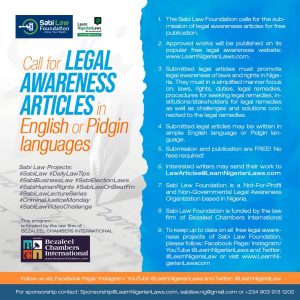How To Prove Gifts In Nigeria. Daily Law Tips (Tip 772) by Onyekachi Umah, Esq., LL.M, ACIArb(UK)
Introduction:
If giving is a vital part of living, then, gifts are evidence of life. In life and death, human beings offer gifts to themselves and this has enormous legal implication. Gifts can be made orally or in writing, however, it is common to find givers who deny their own acts of giving. Also, you can find families/associates who deny the gifts of their members as well as strangers who make claims to property under gift. In this generation, there are too many cases of ex-husbands recovering their gifts of expensive cars and jewelries from their ex-wives. There are also cases of religious followers seeking to recover their gifts from clergies and religious organizations. For this and many more reasons, gifts may end up as disputes in courts, during and even after the lives of the purported givers and the receivers.
Hence, proving gifts has become an important skill in the keeping, using and management of gifts. So, here is “How to Prove Gifts in Nigeria. The steps/procedures shown below, are as explained by the Supreme Court of Nigeria and the Court of Appeal of Nigeria. The judgments of the Supreme Court of Nigeria are final and unquestionable. Hence the position of the Supreme Court on this issue are unquestionable. Gifts and making gifts are allowed in Nigeria, so far as one does not gift a prohibited item or make gift to influence the actions/inactions of public officers and other regulated persons/event (like elections).
First of all, the Supreme Court of Nigeria, defined “GIFT Inter Vivos” in these words; “A gift inter-vivos is an act whereby something is voluntarily transferred from the true possessor to another person with full intention that the thing shall not return to the donor, and with the full intention on the part of the receiver to retain the thing entirely as his own without restoring it to the giver. See Halsbury’s Laws of England. 3rd Edition. vol. 18, page 364 at para 692. The essential thing to consider is that the gift is complete when the donee has accepted it. If that condition is satisfied the donor has no right to revoke the gift. See Dewar v. Dewar (1975) 2 All E.R. 728 at 732.” Per UTHMAN MOHAMMED ,J.S.C ( Pp. 23-24, paras. F-B ). Quotation from the case of ANYAEGBUNAM v. OSAKA & ORS (2000) LPELR-508(SC). Click to access my earlier works on gifts.
Proof of Gift and Proving a Gift:
It is the duty of a recipient/receiver (donee) of gift or his beneficiary (dependents) to always prove that the receiver was truly granted a gift and that the receiver truly accepted the gift. Gifts are often sources of litigations, where the giver (donor) is dead, insane or suddenly regretting his gifting. Whatever be the case, there are ways to establish and proof that one was given a gift. It may be by written documents (especially for lands in cities or under statutory ownership) or by eye witnesses that were present when a person received a gift (especially for lands in rural places or under customary ownership). Below are the words of Justices of appellate courts on this issue;
- “The law is settled that a gift of interest on land must be backed with written document or evidence of witnesses in cases of customary law gift else, the gift when seriously challenged as its validity devolves to the estate of the giver. It is duty of a beneficiary of the gift to prove the existence of such gift especially where the owner, who made such gift is dead and he is survived by heirs who must inherit the property. Alienation or transfer of interest absolute over a family land where the founder is deceased cannot be valid unless done by the head of the family with the consent of principal members of the family. See AGU V ODOFIN (1992) 3SCNJ 161; AJIBADE V PEDRO (1992) 5 NWLR (PT. 241); AMAKOR V OBIEFUNA (1997) ALL NLR 119.” Quotation is from the case of CHIBUZOR & ANOR v. CHIBUZOR (2018) LPELR-46305(CA);
- In recent case of 2020, the Supreme Court of Nigeria held that; “The simple truth is that it was the said appellants who affirmed, positively, that there was such a gift. They, thus, had the burden, both on the pleadings and on the evidence, to prove their assertion…The consequence is that, that claim of gift failed in the absence of any credible evidence to sustain it…” Per CHIMA CENTUS NWEZE ,J.S.C ( Pp. 61-63, paras. E-B ) Quotation from the case of EKWEOZOR & ORS v. REG. TRUSTEES OF THE SAVIOUR’S APOSTOLIC CHURCH OF NIG (2020) LPELR-49568(SC)
- “A gift inter vivos must be made openly. There must be evidence of actual handing over of the land and acceptance thereof in the presence of witnesses under native law and custom. In Madam Alice Orido v. Theophilus Akinlolu, CA/B/253/2004 delivered on 29th March, 2012, Iyizoba JCA held as follows: “Customary law requires no writing for the transfer of land whether upon sale or by way of gift. In lieu of writing however, there must be actual handing over of the land to the donee in the presence of witnesses and the acceptance by him of the gift. Acceptance is as much as customary law as the delivery of possession in the presence of witnesses; without it the gift is invalid, such acceptance must be made with as much publicity as possible….. Actual delivery is not mere evidence of the gift but is part of the gift itself.” Quotation if from the case of ENADEGHE v. EWEKA (2014) LPELR-24479(CA)
- “Now, for the Respondent who relied on gift from his father of the land in dispute, he carried the burden of proving by credible evidence the following two essential facts, namely:(a) The fact of the gift inter vivos to him by his father. (b) The title of his father to the land in dispute which he transferred to him by gift inter vivos.” Per BIOBELE ABRAHAM GEORGEWILL ,J.C.A ( P. 50, paras. B-C ). Quotation is from the case of GABDO v. USMAN (2015) LPELR-25678(CA)
- “…In other words, where a Plaintiff had relied, as in the instant case gift of the land inter vivos by his father, he must first prove this fact of gift and the most crucial fact of title in his father before he can rely on acts of ownership and possession. In the event of failure to prove the root of title pleaded, the Respondent cannot turn round to rely merely on acts of ownership and possession, no matter how long…” Per BIOBELE ABRAHAM GEORGEWILL ,J.C.A ( Pp. 54-56, para. A). Quotation is from the case of GABDO v. USMAN (2015) LPELR-25678(CA)
- “None of the Plaintiff’s Witnesses witnessed the gift from Chief Agunbiade to the Appellant’s father. There was no member of both the Appellant’s family and the family of Chief Agunbiade who witnessed this gift. It is true that a gift inter vivos like the Appellant claimed is valid in all cases. However, the burden of proving by credible evidence is on the Appellant who relies on the gift. In GABO V USMAN (2015) LPELR 25678, the Court held that the person who relies on such gift has to prove two (2) essential facts, namely, the fact of the gift inter vivos to his father. (2) the title of the donor to the land in dispute. See also ENADEGHE V EWEKA (2014) LPELR 24479 where the Court held that: ‘A gift inter vivos must be made openly. There must be evidence of actual handing over of the land and acceptance thereof in the presence of witnesses under native law and custom’.” Per UZO IFEYINWA NDUKWE-ANYANWU, J.C.A ( Pp. 22-24, para. C ). Quotation from the case of OLAJIDE v. AKINBOBOYE (2018) LPELR-46166(CA)
- “The issue was dealt with by Professor Nwabueze in his book “Nigerian Land Law” (1992) Nwamife Publishers Ltd, Enugu PP 367-369 referred to by learned counsel for the appellant at page 13 of his brief of argument. The learned author observed:- “Customary law requires no writing for the transfer of land whether upon sale or by way of gift. In lieu of writing, however there must be actual handing over of the land to the donee in the presence of witnesses and an acceptance by him of the gift.” Per CHINWE EUGENIA IYIZOBA ,J.C.A ( Pp. 16-18, paras. A-C ). Quotation from ORIDO v. AKINLOLU (2012) LPELR-7887(CA)
- “It is clear therefore that to prove gift of land inter vivos, there must be evidence of actual handing over of the land and acceptance thereof in the presence of witnesses. See also Ayinke v. Ibidunni (1959) 4 FSC 280 @ 282 where Ademola CJF observed:- “I also find myself in agreement with the learned trial judge that there are means whereby a man may dispose of certain properties before his death in accordance with native law and custom. It is my view that disposition of properties could be made under native law and custom by a gift followed by a transfer of the property, or a declaration by a man on his death bed in the presence of witnesses.” (Underlining mine). The absence of writing in these transactions under native law and custom make the presence of witnesses to the transactions a necessity.” Per CHINWE EUGENIA IYIZOBA ,J.C.A ( Pp. 16-18, paras. A-C ). Quotation from ORIDO v. AKINLOLU (2012) LPELR-7887(CA)
- “In the case of FOLARIN vs. DUROJAIYE (1988) NSCC 255 AT 265, the Supreme Court, per OPUTA, JSC while, making as reference to customary transfer, the sage said: “To transfer an absolute title under customary law, it ought to be pleaded and proved that the gift was made in the presence of witnesses. To that effect, names of those witnesses should also be pleaded as well as the fact that they witnessed the actual delivery or handing over of the land to the purchaser or donee.” Per FREDERICK OZIAKPONO OHO ,J.C.AÂ ( Pp. 26-27, para. A ). Quotation from the case of EZENWORA & ORS v. EZENWORA (2018) LPELR-43944(CA)
- “…there was no clear-cut evidence that the alleged gift of the property was made in the presence of witnesses to make it a good/perfect and valid gift vide the cases of Ayinke v. Ibidunni (1959) SCNLR 666 at 669, Orido v. Akinlolu (2012) 9 NWLR (pt. 1305) 370 at 387 to the effect that to prove a gift of property inter-vivos there must be evidence of actual handing over of the land or property or declaration of the gift by the owner of the property and its acceptance thereof in the presence of witnesses.” Per JOSEPH SHAGBAOR IKYEGH ,J.C.A ( P. 13, paras. D-F ). Quotation from the case of DAVIES v. RAHMAN-DAVIES & ANOR (2018) LPELR-46557(CA)
Conclusion:
With little or no reliable records across Nigeria, proving gifts can be a daunting task. Hence there is an obvious need to learn and understand how to establish the existence of gifts. Gifts once accepted are gone and irredeemable, unless where the gift was made out of force, fraud or for a limited period. However, it is the duty of the recipient of a gift to prove that the gift was offered to him and that he did accepted the gift. This can be proven through documentary evidence (photos, emails, videos, WhatsApp messages, oral recordings, deed of gift, letters and any other permanently records”. Also, gift can be proven through the testimonies of witnesses (persons that truly witnessed the giving and not persons that merely heard about it). Inability to prove the existence of gift may cost a recipient his gift.
My authorities, are:
- Sections 1, 2, 3, 4, 5 and 6 of the Constitution of the Federal Republic of Nigeria, 1999.
- Sections 124 and 158 of the Electoral Act, 2010.
- The judgment of the Supreme Court of Nigeria (on the meaning of Gift Inter Vivos) in the case of ANYAEGBUNAM v. OSAKA & ORS (2000) LPELR-508(SC)
- The judgment of the Supreme Court of Nigeria (on the revocation of Gift) in the case of IMAH & ANOR v. OKOGBE & ANOR (1993) LPELR-1497(SC).
- The Supreme Court’s decision (on effect of “Acceptance” to a gift) in the case of ANYAEGBUNAM v. OSAKA & ORS (2000) LPELR-508(SC)
- The Supreme Court’s decision (on whether a gift can be rejected) in the case of EBOSIE v. PHIL-EBOSIE & ORS (1976) LPELR-994(SC)
- The judgment of the Supreme Court of Nigeria (on proving Gift) in the case of EKWEOZOR & ORS v. REG. TRUSTEES OF THE SAVIOUR’S APOSTOLIC CHURCH OF NIG (2020) LPELR-49568(SC)
- The judgment of the Supreme Court of Nigeria (on proving Gift) in the case of UGHUTEVBE v. SHONOWO & ANOR (2004) LPELR-3317(SC)
- The judgment of the Supreme Court of Nigeria (on proving Gift) in the case of ANYAEGBUNAM v. OSAKA & ORS (2000) LPELR-508(SC)
- The judgment of the Supreme Court of Nigeria (on proving Gift) in the case of IMAH & ANOR v. OKOGBE & ANOR (1993) LPELR-1497(SC)
- The judgment of the Supreme Court of Nigeria (on proving Gift) in the case of OKWUWA v. STATE (1964) LPELR-25195(SC)
- The Court of Appeal’s decision (on meaning, nature and effect of gift inter vivos) in the case of ABAH v. OGBE (2012) LPELR-14842(CA)
- The judgment of the Court of Appeal (on proving Gift) in the case of CHIBUZOR & ANOR v. CHIBUZOR (2018) LPELR-46305(CA);
- The judgment of the Court of Appeal (on proving Gift) in the case of IGBOZURUIKE & ANOR v. ONUADOR (2015) LPELR-25530(CA)
- The judgment of the Court of Appeal (on proving Gift) in the case of ISIOHIA & ORS v. ELECHI (2018) LPELR-44988(CA)
- The judgment of the Court of Appeal (on proving Gift) in the case of DAVIES v. RAHMAN-DAVIES & ANOR (2018) LPELR-46557(CA)
- The judgment of the Court of Appeal (on proving Gift) in the case of ABAH v. OGBE (2012) LPELR-14842(CA)
- The judgment of the Court of Appeal (on proving Gift) in the case of JOVINCO NIGERIA LTD & ANOR v. IBEOZIMAKO (2014) LPELR-23599(CA)
- The judgment of the Court of Appeal (on proving Gift) in the case of GABDO v. USMAN (2015) LPELR-25678(CA)
- The judgment of the Court of Appeal (on proving Gift) in the case of SAFETI & ORS v. SAFETI & ANOR (2006) LPELR-7579(CA)
- The judgment of the Court of Appeal (on proving Gift) in the case of ORIDO v. AKINLOLU (2012) LPELR-7887(CA)
- The judgment of the Court of Appeal (on proving Gift) in the case of ENADEGHE v. EWEKA (2014) LPELR-24479(CA)
- The judgment of the Court of Appeal (on proving Gift) in the case of OLAJIDE v. AKINBOBOYE (2018) LPELR-46166(CA)
- The judgment of the Court of Appeal (on proving Gift) in the case of EZENWORA & ORS v. EZENWORA (2018) LPELR-43944(CA)
- The judgment of the Court of Appeal (on proving Gift) in the case of DASHE & ORS v. JATAU & ORS (2016) LPELR-40180(CA)
- The judgment of the Court of Appeal (on proving Gift) in the case of YESUFU & ORS v. OKE BAALE (OSOGBO) NUT CO-OPERATIVE INVESTMENT AND CREDIT SOCIETY LTD & ANOR (2014) LPELR-22102(CA)
- The judgment of the Court of Appeal (on the revocation of Gift) in the case of GABDO v. USMAN (2015) LPELR-25678(CA)
- The judgment of the Court of Appeal (on the revocation of Gift) in the case ofThe Court of Appeal’s decision in the case of ABAH v. OGBE (2012) LPELR-14842(CA)
- Onyekachi Umah, “Acceptance of Gift and Effect of Failure to Accept Gift” (LearnNigerianLaws.com, 20 August 2020) <https://sabilaw.org/acceptance-of-gift-and-effect-of-failure-to-accept-gift/> accessed 9 April 2021
- ”Onyekachi Umah, “Who Can Make Gifts And What Are His Powers?” (LearnNigerianLaws.com, 1 May 2020) <https://sabilaw.org/who-can-make-gifts-and-what-are-his-powers-daily-law-tips-tip-560-by-onyekachi-umah-esq-llm-aciarbuk/> accessed 9 April 2021
- Onyekachi Umah, “It Is An Offence To Give Gifts And Money For Election In Any Part Of Nigeria”(LearnNigerianLaws.com, 21 February 2019) <https://sabilaw.org/daily-law-tips-by-onyekachi-umah-esq-tip-273-it-is-an-offence-to-give-gifts-and-money-for-election-in-any-part-of-nigeria/> accessed 9 April 2021
- Onyekachi Umah, “Can An Inheritance Under A “Will” Be Rejected?” (LearnNigerianLaws.com, 6 May 2020) <https://sabilaw.org/can-an-inheritance-under-a-will-be-rejected-daily-law-tips-tip-563-by-onyekachi-umah-esq-llm-aciarbuk/> accessed 9 April 2020)
- Onyekachi Umah, “Abolishment Of Custom Where Daughters Are Forced Not To Marry In Order To Perpetuate Their Fathers’ Lineages” (LearnNigerianLaws.com, 12 March 2020) <https://sabilaw.org/abolishment-of-custom-where-daughters-are-forced-not-to-marry-in-order-to-perpetuate-their-fathers-lineages-daily-law-tips-tip-524-by-onyekachi-umah-esq-llm-aciarbuk/> accessed 9 April 2021.
Sabi Law Projects:
#SabiLaw
#DailyLawTips
#SabiBusinessLaw
#SabiElectionLaws
#SabiHumanRights
#SabiLawOnTheBeatFm
#SabiLawLectureSeries
#CriminalJusticeMonday
#SabiLawVideoChallenge
Speak with the writer, ask questions or make inquiries on this topic or any other via onyekachi.umah@gmail.com, info@LearnNigerianLaws.com or +2348037665878 (whatsapp). To receive free Daily Law Tips, join our free WhatsApp group via https://chat.whatsapp.com/L7h4f1exItZ38FeuhXG4WN or Telegram group, via the below link: https://t.me/LearnNigerianLaws
To keep up to date on all free legal awareness projects of Sabi Law Foundation, follow us via
Facebook Page:@LearnNigerianLaws,
Instagram:@LearnNigerianLaws,
Twitter: @LearnNigeriaLaw,
YouTube: Learn Nigerian Laws,
WhatsApp Groups via (https://chat.whatsapp.com/L7h4f1exItZ38FeuhXG4WN),
Telegram Group: (https://t.me/LearnNigerianLaws),
Facebook group: (https://www.facebook.com/groups/129824937650907/?ref=share)
or visit our website: (www.LearnNigerianLaws.com)
Please share this publication for free till it gets to those that need it most. Save a Nigerian today! NOTE: Sharing, modifying or publishing this publication without giving credit to the author or Sabi Law Foundation is a criminal breach of copyright and will be prosecuted. This publication is the writer’s view not a legal advice and does not create any form of relationship. You may reach the writer for more information.
This publication is powered by www.LearnNigerianLaws.com {A Free Law Awareness Program of Sabi Law Foundation, supported by the law firm of Bezaleel Chambers International (BCI).} Sabi Law Foundation is a Not-For-Profit and Non-Governmental Legal Awareness Organization based in Nigeria. For sponsorship and partnership, contact: sponsorship@learnnigerianlaws.com, sabilaw.ng@gmail.com or +234 903 913 1200.
























































One Response